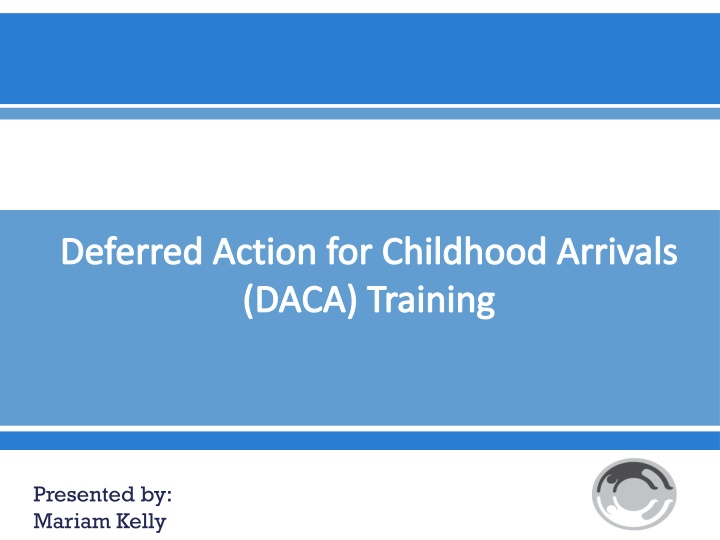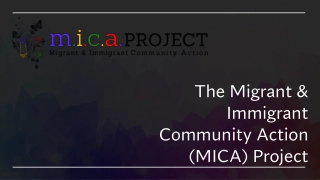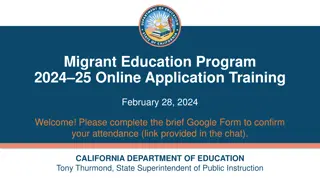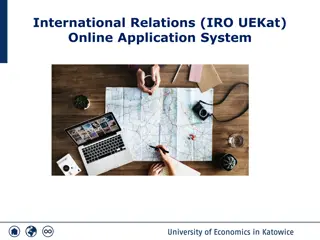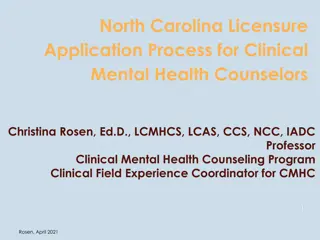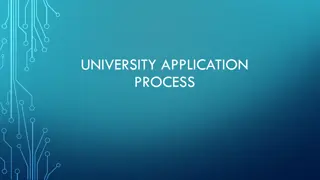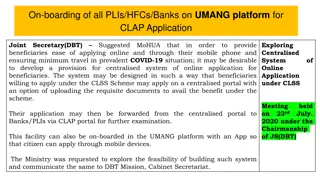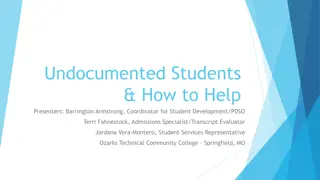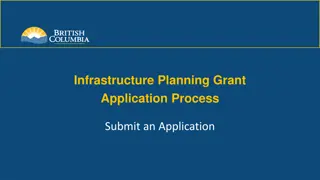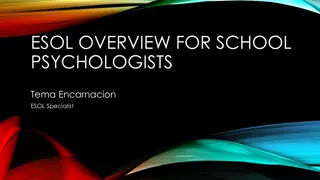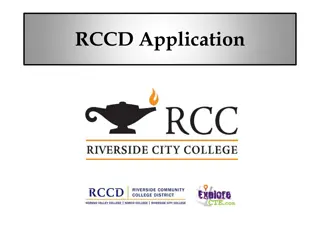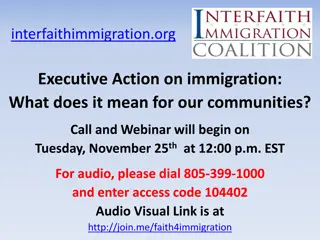DACA Training Information and Application Process
Deferred Action for Childhood Arrivals (DACA) provides protection from deportation and work authorization for eligible individuals brought to the US as children. Learn about the eligibility criteria, required forms for application, and key steps for submitting a DACA request.
Download Presentation

Please find below an Image/Link to download the presentation.
The content on the website is provided AS IS for your information and personal use only. It may not be sold, licensed, or shared on other websites without obtaining consent from the author.If you encounter any issues during the download, it is possible that the publisher has removed the file from their server.
You are allowed to download the files provided on this website for personal or commercial use, subject to the condition that they are used lawfully. All files are the property of their respective owners.
The content on the website is provided AS IS for your information and personal use only. It may not be sold, licensed, or shared on other websites without obtaining consent from the author.
E N D
Presentation Transcript
Deferred Action for Childhood Arrivals (DACA) Training Presented by: Mariam Kelly
What is Deferred Action for Childhood Arrivals? An executive order signed in June 2012 by President Obama Allows undocumented individuals who were brought to the United States (U.S.) as children to be safe from deportation and to work legally in the U.S. Will not be placed into removal proceedings or removed from the U.S. for 2 years from the date of being granted deferred action (unless terminated) Eligible to work legally in the U.S. with an employment authorization card (EAD) Can apply for state ID cards, driver s licenses, and Social Security cards
Who is eligible for DACA? Must prove through documentary evidence that: Arrived in the U.S. before turning 16, and before June 15, 2007 Have resided in U.S. continuously since June 15, 2007 - June 15, 2012 and through to present day Were born after June 15, 1981 (aged 30 or under as of June 15, 2012), and at least 15 years old Currently be in school, have graduated from high school, have obtained a general education development certificate, or are honorably discharged veterans of the Coast Guard or Armed Forces of the U.S. Have not been convicted of a felony offense, a significant misdemeanor offense, multiple misdemeanor offenses, or otherwise pose a threat to national security or public safety.
What forms should be included in a DACA application? USCIS Forms: I-821D: Consideration of Deferred Action for Childhood Arrivals (form updated June 4, 2014) I-765: Application for Employment Authorization I-765WS: Employment Authorization Worksheet G-1145: E-Notification of Application/Petition Acceptance
I-821 D Must use most recent version of the form (6/4/2014) List name of client exactly as it appears on identity document (passport, birth certificate). Include both last names. Do not add hyphen unless it appears on identity document that way. Education Information: if client is currently in high school, list date of last attendance (likely same day as clinic) Preparer Information: List your name, Business/Organization name is FREE DACA CLINIC, sign your own name (stickers provided for address, phone, etc.) Interpreter Information: List Interpreter s contact information if client is not a fluent English speaker
I-765 Q. 9: False Social Security Numbers- DON T include them On I-765 and supporting documentation for continuous physical presence Qs. 12-14: Manner of Entry: B1/B2 Visa Entry with tourist visa; or No Lawful Status Covers Entry without Inspection, Entry with Fraudulent Documents, Waive-Through Checkpoint Q. 15: Current Status: No Lawful Status- DACA Applicant Q. 16: Eligibility Category: (c)(33)
I-765 Worksheet (WS) & G-1145 I-765 Worksheet Must be included Does not require signature Does not require supporting documentation Numbers need not be exact G-1145: E-Notification of Application/Petition Acceptance Optional form Does not require signature Allows applicant to get an email or text from USCIS when application is received by USCIS USCIS may use this as a tool to notify people about the future renewal dates, other issues
What else should be included? Finished DACA application package includes: Cover Letter Forms Supporting Documents, sorted by color page separators Proof of Age and Identity Proof of Educational Requirement Proof of Continuous Physical Presence (2007-Present) 2 U.S. passport photos (name and date of birth on back in felt pen) Money order for $465, made payable to U.S. Department of Homeland Security (check with CLSEPA staff if client expresses inability to pay fee)
Proving Age and Identity Copy of Birth Certificate with Certified English translation Copy of Passport from Applicant s country of citizenship Other government-issued photo identification, such as Matricula Consular Student Identification card (issued by school, with photo)
Proving Educational Requirement Copy of High School Diploma Copy of school transcript (if still in high school) Copy of GED Equivalency Certificate Proof of enrollment in GED program (personalized letter from program proving enrollment, copy of class schedule with Applicant s name and date) Proof of enrollment in classes to build skills for GED (i.e. English as a Second Language classes)
Proving Continuous Physical Presence School transcripts, report cards, schedules, awards, certificates, ID cards, class photos with names/dates Medical records: vaccination records, log of doctor visits, hospital stays, dental records, prescriptions in client s name Tax returns (so long as Applicant s name appears somewhere) Bills, receipts, tickets, photo badges, dated photographs If nothing else available: affidavits, declarations from trusted sources, social media (i.e. location check-ins) If any absence from US: provide details in addendum
Simple DACA vs. Complex DACA: What will you see at a clinic? Simple Cases Complex Cases Arrest history: juvenile arrest, minor arrest as an adult Immigration violations: outstanding removal order, expedited removal at the U.S. border, voluntary departure but never departed, possible immigration fraud Gaps in physical presence Needs individualized, ongoing representation in event of additional Request for Evidence (RFE) by USCIS Requires Supervisory Review at USCIS (6 months or more to process) o o Tend to be done in groups (clinics/workshops) or pro se o o Clean record, no immigration violations, no former deportation order, no contact with Immigration and Customs Enforcement o o o Fairly straightforward, high grant rate, are usually processed quicker o
DACA Renewal A new Form I-821D allowing for renewal applications was issued by USCIS in June 2014 DACA Renewal applicants should file for renewal 120-150 days before expiration of DACA Okay to accommodate late-filers, but they should send application out via Express Mail as soon as possible USCIS said it will make every effort to process renewal applications as timely as possible, if made within 120 days of expiration
What to Look for on Renewal Applicants Previous Employment Authorization Card? I-765, Q. 16. Eligibility Category: Always (c)(33) for DACA Alien Registration Number (A#) I-765 Q. 11: Which USCIS Office? For DACA card number will start with WAC (California Service Center) or LIN (Nebraska Service Center) I-765 Q. 11 When DACA was granted: Use Valid from date DACA Expiration Date, use this for I-821D page 1, Q. 2
DACA Renewal vs. Initial DACA Filing No Supporting Documentation Necessary, most cases will only need to include the following: Forms I-821D; I-765; I-765WS, G-1145 Copy of previous EAD card (front and back) Money Order for $465 payable to U.S. Department of Homeland Security, and 2 passport style photos Parts of I-821D that you DO NOT need to fill in: Part 2, p. 3, Address and Travel Do not list all prior addresses, only new addresses client has lived in since receiving DACA approval Do fill in Travel Information, don t forget Questions 8-10 Skip all of Part 3 (end of page 3-page 4)
How do eligibility changes affect DACA renewal? Travel: Traveling outside of the U.S. with advance parole is okay, so long as the person traveled within the timeframe granted by USCIS Traveling outside the U.S. without advance parole automatically terminates DACA. This becomes a complexcase- should not be done in a clinic. Arrests: DUI, felony, significant misdemeanor, and possibly non-significant misdemeanors can make a person ineligible for DACA Renewal Any kind of arrest history post-DACA grant: complex case, should not be done in a clinic. DACA Expired for One Year or More: If DACA grantee has not applied for renewal one year or more after expiration of employment authorization card, they cannot renew and instead must apply as initial applicant
Tips for DACA Clinic DO urge clients to respect the law and avoid arrests DO provide certified translations for all non-English documents submitted with application DO make sure your client has a copy of everything sent to USCIS DO have your client sign all forms in blue ink DON T send any original documents to USCIS DON T hesitate to contact CLSEPA if you have any questions What to Expect at Clinic? Client paired with 1-2 attorneys/paralegals, interpreter if needed Forms drafted and printed out, documents organized CLSEPA Immigration Attorney provides final review of forms and supporting documents Client mails out application on his/her own (post-clinic instructions given out) 1. 2. 3. 4.
What happens after DACA package is submitted? Within 2-3 weeks: Receipts arrive for I-821D and I-765 Within 4 weeks: Biometrics Appointment Notice sent to client Within 3 months: Request for Evidence (if any) sent, or approval (simple cases) Within 6 months: if no response from USCIS, client can call USCIS Customer Service for more information about processing time This information is provided to client via Post-Clinic Instructions sheet.
DACA and Travel Before DACA Approval: No travel outside of U.S. Air travel within U.S. only if person has valid, non-expired state-issued ID After DACA approval: Flights within continental U.S., Hawaii, Alaska OK (must have state- issued I.D.) Travel outside the U.S. (including Puerto Rico, U.S. Virgin Islands) Must have advance parole approval prior to travel (I-131) Travel must be for educational, employment, or humanitarian reasons (i.e. study abroad, or dying relative)
Updates on DACA On November 20, 2014, Pres. Obama announced a series of executive actions, including removing age cap from DACA, extending grant period to 3 years, and introducing DAPA (Deferred Action for Parents). An injunction has been issued by a district court in Texas which has halted the implementation of the new programs but DOES NOT affect existing DACA as we know it (pursuant to June 15, 2012 announcement). We expect new programs to eventually move forward please keep in touch for new pro bono opportunities with expanded DACA and DAPA!
Questions? Joyce Song, Esq. Pro Bono Director & Supervisor of Small Business Program jsong@clsepa.org Mariam Kelly, Esq. Senior Attorney, Immigration Program mkelly@clsepa.org
